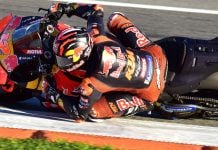FIRST PERSON/OPINION
By John Ulrich
It’s easy to discount the news of former racer John Donnelly’s arrest for running a Ponzi scheme as something that only affected rich investors too stupid to diversify their assets, and to wonder why Roadracingworld.com reported it.
But there’s more to it than that, and therein lies a cautionary tale.
While some of the investors may well have been wealthy, some were regular racers and their family members who invested $5000 or $10,000 because Donnelly’s friends and racing associates told paddock tales about how their money was earning better interest than bank accounts or CDs, and how they had been investing with Donnelly with good results for years. It was easy to believe when you saw Donnelly’s smiling face over in the Army of Darkness pit area, hanging out with smart people like Sam Fleming and Melissa Berkoff, race after race, season after season. Donnelly didn’t pitch people; he didn’t tell potential investors that he based his trading theories on astrophysics or weird theories. Instead, Donnelly hinted that he wasn’t accepting any new investors and let his friends and associates talk about how well things were working out; the scheme grew from there.
Sam Fleming took what he knew to the feds after being alerted to the fraud by a friend who tried to cash out and couldn’t get his money. Fleming, who owns a consulting business involved in hospital management, says he has lost “a lot of money” to the fraud. But Fleming is not the only racing person affected by the case.
There’s the racer who may have scraped together $5000 over the course of several seasons of contingency hunting, then “invested” it with Donnelly in the hope that it would become a future nest egg.
There’s the racer’s sister who built her account with Donnelly up over a 10-year period, and had $20,000 on the books. She kept her money in the account instead of paying off her car, because the claimed rate of annual return was greater than the interest rate on the car loan.
For over a decade, Donnelly churned out monthly trade reports showing a 1.9% gain one month, maybe a -.5% loss another month. By the end of the year, the claimed return may have been 12% or may have been 21%. Some “investors” withdrew money, and the checks showed up as ordered and cleared the bank no problem. Some just kept putting in a little money here, a little money there, for the future. As long as nobody tried to take out too much, too fast, the scheme hummed along.
For a scheme like Donnelly’s to succeed, there has to be some sort of connection to be worked. In Donnelly’s case, the connection was motorcycle road racing, and his involvement in the sport made other racing people more likely to consider him a friend and trust him. Similar schemes have spread through church-related groups and run for decades, with what seemed like reliable reports and (relatively small-scale) disbursements upon demand making it seem legit.
But as Roadracing World’s own David Swarts pointed out so well yesterday, the Donnelly case is another reminder that we don’t really know the people we see at the races. Just because we see them in the paddock race after race and year after year, doesn’t mean that they are honest, that they are good people, or that they can be trusted. Some may be involved in child pornography, others may steal wallets from haulers or pit areas while racers are out on the track, and some run investment schemes.
Or, as Trudy Ulrich reminds me way too often, people you know in racing shouldn’t automatically be regarded as your friends.
That important reminder is why the Donnelly tale deserves attention, and why Roadracingworld.com reported it.
Read more here:
~http://www.charlottesvillenewsplex.tv/home/headlines/41152942.html~






